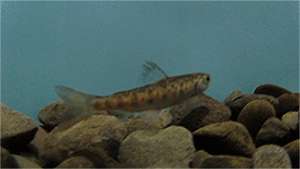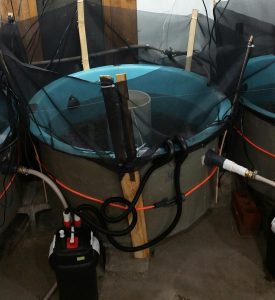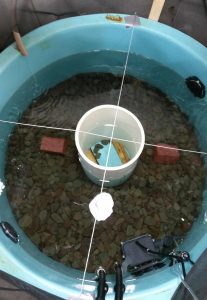Improving assessment of critical habitat for Atlantic salmon in a rapidly changing climate
Nicole Ramberg-Pihl is a Ph.D. Student at the University of Maine enrolled in the Ecology and Environmental Sciences program. As an IGERT A2C2 Fellow (Integrative Graduate Education and Research Traineeship, Adaptation to Abrupt Climate Change), she is interested in how abrupt changes in climate impact the dynamics of freshwater systems. Her advisors are Hamish Greig (School of Biology and Ecology) and Steve Coghlan (Wildlife, Fisheries, and Conservation). Nicole’s current project focuses on how changes in climate coupled with competition from non-native species impact juvenile Atlantic salmon in Maine streams.

Atlantic salmon, Salmo salar, once thrived in the streams and rivers of New England. However, salmon populations have declined due to a combination of factors that include loss of instream habitat. The decline has led to the Atlantic salmon being listed as a federally Endangered Species. Currently, Maine harbors the last wild Atlantic salmon populations found in the United States. As juveniles, salmon spend about 1-3 years in freshwater streams before they mature and undergo changes which allow them to survive in saltwater, a process known as smoltification. Atlantic salmon then spend another 2-3 years in the ocean before heading back to their streams of origin to spawn. This means that their time in Maine’s streams, especially as juveniles, is a critical stage in their life history. Despite strong efforts to restore Atlantic salmon habitat and increase their chance of survival, several factors still threaten their recovery.
Two such factors include changes in climate, which could alter stream flow and temperatures, and introduced species, which could outcompete salmon for both space and resources. In terms of climate change, Nicole and her fellow researchers are particularly interested in examining changes that are anticipated to occur abruptly. For example, it is expected that extreme events in precipitation, which causes flooding or drought conditions, as well as extreme temperature events, will occur more often than experienced today. Moreover, changes in climate especially increases in water temperature, could help the expansion of non-native invasive species such as smallmouth bass, Micropterus dolomieu. Previous research on Atlantic salmon and smallmouth bass competition under climate change scenarios is limited, despite the fact that smallmouth bass distributions overlap with critical Atlantic salmon habitat. Given this information, the goal of Nicole’s research is to understand how the combined effects of climate change and competition with non-native smallmouth bass impact juvenile Atlantic salmon in Maine streams.


Nicole conducts her research at the Aquaculture Research Center located at the University of Maine Orono. She and her fellow researchers spent last summer setting up their lab space and building tanks that are designed as artificial stream environments. In these stream environments, researchers simulate both flooding and drought conditions by altering stream flow and water temperature. Above each of the tanks is a camera that records all fish activity for an entire trial. This allows her to gather information on how salmon and smallmouth bass interact with one another under varying flow and temperature conditions. Although she is currently analyzing footage from the pilot season which occurred in the summer and fall of 2016, it is clear that the cameras capture important behaviors that indicate how juvenile salmon are performing in the presence and absence of smallmouth bass.
Overall, she and her fellow researchers are interested in examining how the interplay of climate change and competition impact juvenile Atlantic salmon performance. This research will provide new information to support important resource management decisions, such as fish stocking practices and targeted habitat restoration that could ultimately assist in salmon recovery efforts.
Acknowledgements:
This research was supported by the US National Science Foundation Adaptation to Abrupt Climate Change IGERT program grant DGE-1144423, Maine Sea Grant, and the Atlantic Salmon Federation Olin Fellowship.
The research would not be possible without undergraduate research team members Dan Perry, Mitch Paisker, Spencer Kelley, Tyson Porter, and Cassidy Bigos.
By Nicole Ramberg-Pihl.
